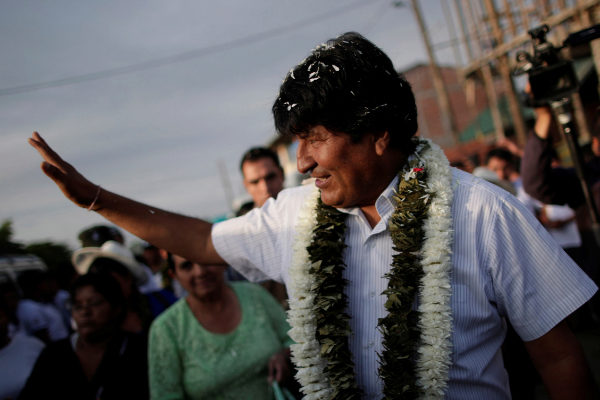When the first indigenous president of Latin America was born, in October 1959, he was destined to be Evaristo. This was established by the "picturesque Bristol calendar", so in vogue at that time to give names of Catholic saints to newborns. But Dionisio Morales didn't like the idea, that name was too long for his son. As if something told him that the baby who struggled to survive since before he was born, something that the two brothers who preceded him did not need, needed a loud and shocking name to change the destiny of his nation.
So he chose Evo, the shortest version of the initial name, a contraction of which only the first two letters and the last one remained. All that previous discussion with the priest, who in those times also sent a lot.
The adventures of his birth and baptism are described by the leader 'Aymara' in his autobiography, 'My life, from Orinoca to the Burned Palace' , a long account of how life conspired with politics to push him to the Presidency of his country , a position until then forbidden for the natives. Today, 60 years after his birth and after 14 of his first electoral victory, the name of Evo, which was the longest-running current president of the continent , is already part of the range of names, as short and shocking as his but that the history of the region has changed so much: Fidel, Lula, Raúl ...
The most paradoxical thing is that there is not much left of that Evo, the one who came to power from the 'cocalera' leadership of the Bolivian Andes, in hard struggle with the lifelong powers of a country mired in poverty. An unexpected turn for a Bolivia with presidents who spoke with an accent so gringo that they were not even understood.
A simple glance at the hitherto almighty president brings Evaristo closer to him, determined to perpetuate his name in power, to extend it by force in the history of his country, even beyond 2025, when the next term expired. If there is a turning point, it happened in 2016, when he lost the referendum to change the Constitution. "Those who said 'yes' (48.7%) is for Evo to continue. Those who said 'no' (51.3%) is for Evo not to go," the president told reporters to confirm that in the America of the revolution does not matter much what the people want . Already demonstrated by his great political godfather and ally, Hugo Chavez, who after losing a similar consultation in 2007 defined the triumph of the students who confronted him as "a shit victory."
His "brother", Nicolás Maduro
From Evo to Evaristo, although not official or recognized. The indigenous leader himself likes to repeat his name, "Evo" or "the Evo", as if he realized that the honeys of power were making him fat and wanted to correct him with words. The same happened to his ally Hugo.
Nothing remains in today's bourgeois Evo of the humility of the time ("I didn't know the underwear until I was 14"), forgotten by the speeches that accompany the populist leaders of the continent, another issue that part of the country does not forgive the former president, whose main safeguard has been the economic boom enjoyed by the Andean country . A bonanza born in the nationalization of gas resources (mostly in Brazilian hands) and a solvent and effective administration of public accounts, always under the tutelage of its ineffable vice president, García Linera , the gray brain of the administration of the Socialism Movement (MAS), and former minister Luis Arce .
Morales has liked apoltronado in power, so protected that he did not hesitate to kick without pressure to anyone who pressed him , either in one of those usual soccer pachangas or in a game of political chess. The indigenous 'Aymara' pursued his political enemies without dissimulation, punished the private press, took advantage of the powerful state apparatus to fill the polls and aligned himself unrestrictedly with his "brother" Nicolás Maduro, beyond torture and extra-sumarial executions denounced by the former left-wing president of Chile, Michelle Bachelet, with whom Evo never made good friends. The historical disagreement of the exit to the sea of Bolivia prevented it again and again.
As you announced during the last campaign, a life like yours, brimming with marathon days of almost 20 hours, needed a second volume of biography. "So far we are not mistaken, together we change history. We are going for a secure future!", Cried the revolutionary leader in Oruro, near his native Orinoca, a small town so small that the maps forgot about him. There, where the fight for survival and against exclusion forged him to become a charismatic leader determined to make his home the Burned Palace , the former presidential seat. But it can no longer be. The street, the OAS, the army, the police have bent Evo Morales.
According to the criteria of The Trust Project
Know more- Bolivia
- Evo Morales
Latin America The peaks of Puebla and Lima stage the pulse for Venezuela in the region
Bolivia Bolivia deepens its crisis while the OAS continues the electoral audit with the presence of Spain
The spiral of violence takes another life in Bolivia

